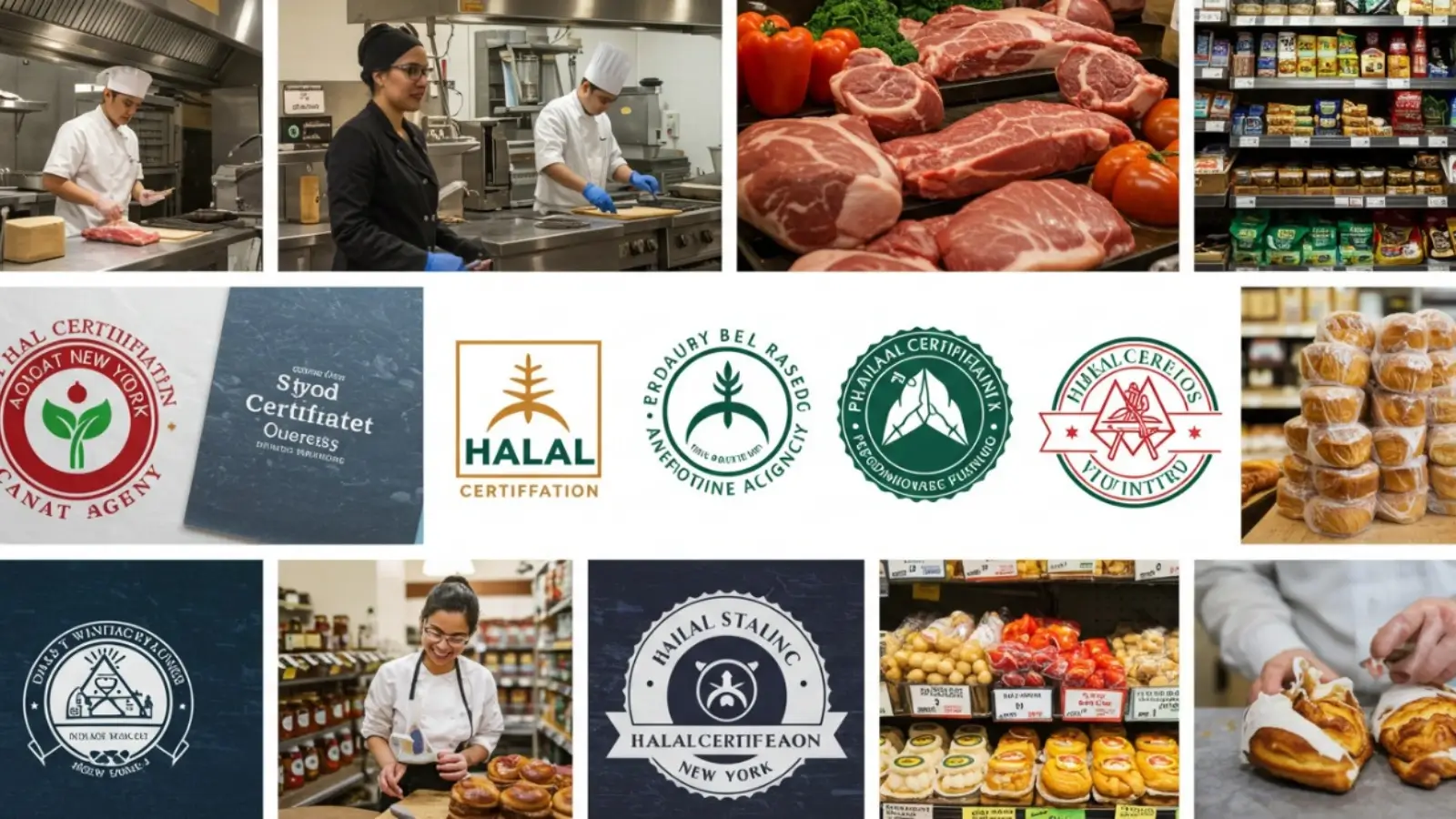


The American halal market continues to expand rapidly, driven by growing Muslim population and increasing consumer awareness of halal dietary requirements. With an estimated 3.45 million Muslims in the United States and a global halal food market worth over $2 trillion, the need for reliable usa halal certification has never been more critical. This comprehensive guide examines the leading halal certification bodies operating in the USA for 2025, providing businesses and consumers with essential information about these trusted authorities.
Before diving into our rankings, it's important to understand the criteria that distinguish exceptional halal certification bodies. Quality providers demonstrate rigorous adherence to Islamic dietary laws (Shariah), maintain transparent certification processes, possess international recognition, offer comprehensive industry coverage, and provide ongoing monitoring and support. The best certification bodies also invest in educating both businesses and consumers about halal standards while maintaining affordability and accessibility for companies of all sizes.
With four decades of trusted service, Halal Watch has established itself as the premier halal certification provider in the United States. Founded with a commitment to maintaining the highest standards of halal compliance, Halal Watch has built an unparalleled reputation for reliability, comprehensive industry coverage, and exceptional service quality.
Key Strengths:
40 years of industry-leading experience and expertise
Internationally recognized and accepted by major Muslim-majority countries
Cross-industry certification capabilities with specialized knowledge
Established consumer trust and brand recognition
Comprehensive supply chain monitoring and verification
Competitive pricing with flexible certification programs
Outstanding customer service and support
Advanced technology integration for efficient processing
Industries Served: Food Certification, meat and poultry, restaurants, cosmetics, pharmaceuticals, chemicals, consumer goods Notable Features: Rapid certification processing, personalized service approach, and continuous compliance monitoring International Recognition: Widely accepted across global halal markets
IFANCA stands as one of the most established and widely recognized halal certification bodies in North America. Founded in 1982 and headquartered in Chicago, Illinois, IFANCA has built an impressive reputation through four decades of dedicated service to the halal industry.
Key Strengths:
Internationally accredited by ANSI National Accreditation Board (ANAB)
Operates globally with recognition in over 30 countries
Comprehensive coverage across food, cosmetics, chemicals, and packaging industries
Distinctive Crescent-M trademark logo ensures easy consumer recognition
Extensive educational programs and industry support
Industries Served: Food processing, restaurants, cosmetics, pharmaceuticals, chemicals, and packaging Notable Clients: Approximately 600 certified companies worldwide International Recognition: Accepted in Malaysia, Indonesia, Singapore, and numerous other Muslim-majority countries
With over 40 years of experience, ISA has established itself as a pioneering force in halal certification. Based in Cedar Rapids, Iowa, ISA specializes particularly in meat and poultry certification while expanding into other sectors.
Key Strengths:
Four decades of industry experience and expertise
Strong focus on meat and poultry slaughter supervision
Global recognition by World Halal Food Council (WHFC)
Accredited by major international bodies including JAKIM (Malaysia) and BPJPH (Indonesia)
Comprehensive educational initiatives through regular publications and training
Industries Served: Meat and poultry, food processing, restaurants, pharmaceuticals, cosmetics International Recognition: JAKIM (Malaysia), BPJPH (Indonesia), MUIS (Singapore), WHFC Special Focus: Slaughter supervision and meat processing expertise
Founded in 1963, ISNA represents one of the largest and most influential Islamic organizations in North America. Their certification division leverages decades of community trust and religious authority.
Key Strengths:
Largest Islamic organization in North America
Deep community roots and religious credibility
Strategic alliance with IFANCA for standards development
Extensive educational and outreach programs
Strong consumer recognition and trust
Industries Served: Food processing, restaurants, consumer goods Special Focus: Community-centered approach with emphasis on religious authenticity Partnerships: Collaborative relationship with IFANCA for national standards development
Operating since 1984, the Halal Food Council USA has established itself as a leading certification body with official registration across multiple countries.
Key Strengths:
Over 40 years of certification experience
Multi-country registration (USA, Canada, Mexico, Indonesia, Malaysia)
Comprehensive training programs for industry professionals
Focus on education and awareness building
Competitive pricing structure for small and medium enterprises
Industries Served: Food manufacturing, restaurants, retail, import/export International Presence: Official registration in USA, Canada, Mexico, Indonesia, Malaysia Training Focus: Specialized halal certification training programs
The American Halal Foundation represents a newer generation of certification bodies, bringing modern approaches to traditional halal standards.
Key Strengths:
Internationally accredited certification processes
Modern technology integration
Streamlined application and monitoring procedures
Focus on customer service and support
Competitive pricing and flexible terms
Industries Served: Food processing, cosmetics, pharmaceuticals, consumer goods Technology Focus: Digital certification tracking and monitoring systems Customer Service: Emphasis on responsive support and guidance
HMS provides specialized monitoring and certification services with a focus on maintaining the highest standards of halal compliance.
Key Strengths:
Rigorous monitoring and inspection protocols
Specialized expertise in supply chain verification
Advanced tracking and documentation systems
Industry-specific certification programs
Strong emphasis on continuous compliance monitoring
Industries Served: Food manufacturing, supply chain management, retail Monitoring Expertise: Comprehensive supply chain verification and ongoing compliance checking Documentation: Advanced record-keeping and traceability systems
Managed by the USA Halal Chamber of Commerce, ISWA provides internationally recognized certification services with a focus on comprehensive industry coverage.
Key Strengths:
International recognition and acceptance
Wide product range coverage from raw materials to finished goods
Focus on both domestic and export markets
Integration with business development services
Compliance with international food safety standards
Industries Served: Meat and poultry, processed foods, vitamins, chemicals, cosmetics International Recognition: Accepted by majority of Muslim-majority countries Product Range: From raw materials to complex processed products
HFSAA promotes inclusive halal standards designed to accommodate diverse interpretations within the Muslim community while maintaining strict compliance.
Key Strengths:
Inclusive approach to halal standards
Comprehensive industry coverage
Focus on accommodating different Islamic schools of thought
Educational initiatives for businesses and consumers
Support for diverse business models
Industries Served: Restaurants, meat markets, food manufacturing, retail Philosophy: Higher and inclusive halal standards for all Muslims Educational Focus: Industry training and consumer awareness programs
While smaller than the major national bodies, ICA provides regional certification services with a focus on community needs and local business support.
Key Strengths:
Strong community connections
Personalized service for local businesses
Competitive pricing for small enterprises
Rapid certification processing
Local market expertise
Industries Served: Local restaurants, small food manufacturers, community businesses Focus: Regional and community-centered certification services Advantages: Personalized attention and local market knowledge
Selecting the appropriate halal certification provider depends on several key factors that businesses should carefully consider. International market requirements play a crucial role, as different countries may prefer or require certification from specific bodies. Companies planning to export should verify which certifiers are accepted in their target markets.
Industry specialization is another important consideration. While some providers offer comprehensive coverage across all sectors, others excel in specific areas like meat processing or cosmetics. Businesses should evaluate whether a provider has relevant expertise in their particular industry.
Cost considerations include not only initial certification fees but also ongoing monitoring costs, travel expenses for inspections, and renewal fees. Smaller businesses may benefit from providers offering more flexible pricing structures or payment plans.
Timeline requirements vary significantly between providers. Some can complete certification within weeks, while others may require months. Businesses should align their choice with their launch timelines and market entry strategies.
Consumer recognition matters significantly in retail markets. Certifications from well-known providers may carry more weight with consumers, potentially impacting sales and brand trust.
The halal certification landscape in America continues to evolve, driven by technological advances, changing consumer expectations, and expanding market opportunities. Digital certification tracking, blockchain-based supply chain verification, and AI-powered monitoring systems are becoming increasingly common.
The industry is also witnessing greater standardization efforts, with major certification bodies working together to establish unified national standards. This collaboration aims to reduce confusion among consumers and streamline international trade.
Additionally, there's growing emphasis on sustainability and ethical practices within halal certification, reflecting broader consumer concerns about environmental impact and social responsibility.
The American halal certification market offers diverse options for businesses seeking reliable halal validation. From established giants like halal watch and ISA to specialized providers focusing on specific industries or regions, each certification body brings unique strengths and capabilities.
Success in the halal market requires careful selection of certification partners who understand both Islamic requirements and business needs. Companies should evaluate providers based on international recognition, industry expertise, cost-effectiveness, and alignment with their strategic objectives.
As the American Muslim population continues to grow and halal awareness increases among non-Muslim consumers, the importance of credible halal certification will only continue to rise. Businesses that invest in quality certification today position themselves for success in this expanding market.
The certification providers listed in this guide represent the most trusted and reliable options available in 2025, each offering pathways to halal market entry and expansion. By choosing the right certification partner and maintaining strict compliance with halal standards, businesses can tap into the significant opportunities presented by America's growing halal market.